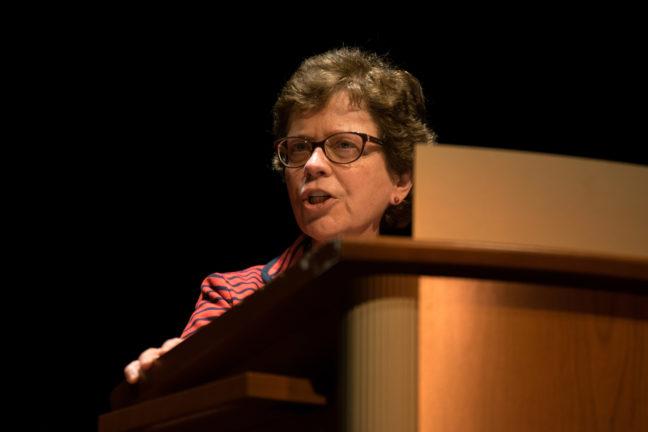A memo reported on by the New York Times triggered University of Wisconsin Chancellor Rebecca Blank to co-write a letter to U.S. Secretary of Education Betsy DeVos, urging her to oppose changes to the definition of gender. Princeton University President Christopher Eisgruber and Rutgers University President Robert Barchi also co-wrote the letter.
UW professor Finn Enke, who specializes in the history of gender and sexuality, believes the effects of the memo can already be observed.
The memo called for certain government agencies to adopt a uniform definition of gender, which would define an individual as either male or female based on the genitalia they were born with, according to the New York Times. If such a definition were applied to Title IX, the legislation that protects against education discrimination on the basis of sex, gender identity protections would be rolled back.
“These protections are important because transgender Americans in all parts of the country, including students and others on our campuses, have faced discrimination, isolation and harassment,” the letter from Blank reads. “Providing these protections is fully consistent with basic principles of fairness and respect for others.”
Professor Steph Tai, who teaches administrative law at UW, said a binary legal definition of gender could impact many parts of a transgender student’s life, including the bathroom they use, the sports team they are allowed to play for and even the health insurance coverage they are able to get.
This could lead to social pressure and anxiety for affected students, Tai said.
“There’s been documentation of transgender folks who can’t use the bathroom of their gender just holding it all day, which is not healthy for anyone,” Tai said.
Enke said it’s difficult to imagine that such a platform would gain any legal purchase if it was pursued as policy.
UW Chancellor Blank reaffirms UW’s commitment to Title IX protections
But even the suggestion of such a policy has raised anxiety among transgender and intersex people and even increases the threat of violence among these groups, Enke said.
“Suggesting the policy does have a profound impact on all people,” Enke said. “It makes all people very afraid that maybe they don’t conform enough and it specifically makes it more difficult for transgender and intersex people to live in our society.”
The day after the memo’s contents were disclosed, Trans Lifeline, an organization that seeks to fight suicide and improve life outcomes among transgender people according to their website, reported on social media that their hotline had received four times the average number of total daily callers.
Tai said it will be a long time before any possible new policy defining gender is implemented. A policy defining a person’s gender as male or female at birth would struggle to survive a legal challenge because it fails to take into account the intersex community, a group that is well documented in the medical community, Tai said.
In response to the memo, the American Medical Association adopted a policy reaffirming that the AMA would oppose efforts to deny an individual’s right to determine their gender identity.
“Sex and gender are more complex than previously assumed,” AMA Board Member William Kobler said in a press release. “It is essential to acknowledge that an individual’s gender identity may not align with the sex assigned to them at birth. A narrow limit on the definition of sex would have public health consequences for the transgender population and individuals born with differences in sexual differentiation, also known as intersex traits.”
Tai said Blank’s letter could have significance in a lawsuit challenging the Trump administration policy on gender. Challengers could cite the letter as evidence that the policy was made without legal basis or without proper deliberation, Tai said.
UW takes action on sexual assault through added staff, increased training
Blank also wrote a letter to the Group Insurance Board along with several other UW chancellors in the summer urging GIB to lift a ban on coverage of gender affirming surgery and related treatments. Tai said the most recent letter could be seen as a progression of this earlier advocacy, anticipatory helping with challenges to the law or a combination of both.
Enke said Blank probably chose to co-pen the letter because the policy could potentially threaten the university’s ability to operate as a public institution. With a policy change, it would be difficult for diversely gendered and intersex students to legally exist, Enke said.
“The university community and chancellor Blank values all the people who are in this community,” Enke said. “Losing trans, non-gender conforming and intersex people in this community or opening up these communities of already at-risk people to discrimination coming from any level undermines the quality of the education that’s being offered here and undermines the quality of the institution by limiting who can be here and who can’t be here.”
In an email to the Badger Herald, the Office of the Chancellor declined to comment on the letter, saying Blank is “letting the statement stand for itself.”
Any policy regarding a change in legal definition will be subjected to a period of public comment, which must be taken into consideration. If the White House administration chooses to adopt a new gender policy, anyone who wishes to comment on it will have the ability to do so at regulations.gov. Tai encouraged everyone to weigh in, regardless of their position.













